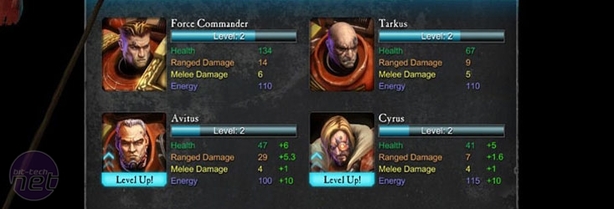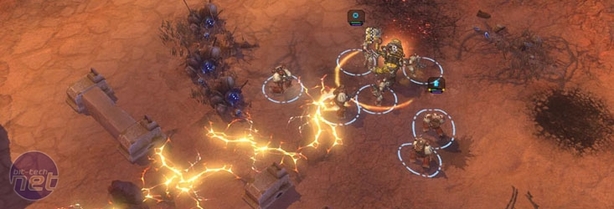Genre Hybrid
It has to be said though that one thing that Dawn of War II has begun to do is to stray confusingly far from the conventions of the RTS genre in the singleplayer campaign.In fact, if it weren’t for the fact that we’d likely be lynched by pedants and Warhammer nut-jobs then we’d be tempted to call Dawn of War II more of an RPG than a strategy game. You see, not only are your units fewer and more personable, but they can also be upgraded over time. Not upgraded in the usual RTS way either, where soldiers have for a long time suddenly achieved Veteran status and been able to shoot 50 percent faster by virtue of having a few wrinkles.
The RPG side of Dawn of War II is a lot more traditional that this; your selection of squad leaders are all different classes, they collect XP at the end of every battle and can eventually level up. You can even swap around their weapons and armour, altering their stats and unlocking new abilities - everything from simple grenades and satchel charges to orbital bombardments, jetpack attacks and the option to deploy sentry guns and artillery.
At first, the conclusion of all this didn’t dawn on me. Only when I looked down and realised I’d been tapping the Space Bar instinctively pausing and un-pausing the game did I realise that at least part of my brain thought it was playing a Baldur’s Gate mod. This isn’t an RTS – it’s an RPG, ohmygod, and the more I think about it the more certain I am with that categorisation. And the more I like it.
Ok, so it isn’t a pure RPG, perhaps. It definitely has a strong strategy feel (especially if you bump the difficulty up) and there’s a fiddly-little cover system and so on to keep in mind, but it definitely feels like these take a backseat when compared to the special abilities that are the source of most of the strategy. The
In between missions is where the more typical strategy stuff kicks in, with you having to choose which territories you want to expand into next – and your choices can have consequences later in the game. As time goes on and the Eldar and Tyranid wade into the increasingly complex battlefield you have to hop between planets, with the game keeping track of how much time everything takes and what your overall war goals are over time. The way it has been structured makes choosing the right missions like the process of selecting the right quests then, though we’d never suggest such a thing, honest.
Joking aside though, the game really does play a lot more like a tactical RPG than an RTS, especially since there’s no base or unit building and your party is chosen before the mission begins. While you can launch and use artillery, these are attached to specific commanders or captured forts, no self-built bases.
It’s not a bad thing either – it’s actually a lot more fun than you’d expect and the fact that your characters are always upgrading means they remain engaging and you can constantly try new tactics. It may not be as tactical as the hardcore fans will want, but the streamlined gameplay benefits extraordinarily and the focus on managing smaller squads in more detail gives the game a much more likeable and accessible strategy feel. Lots of cheap tank-rush tactics are done away with in favour of using suppressing fire and captured beacons or generators to gain the advantage.
Well, in some areas anyway. There are some parts of the game that try to put on clothes meant for other genres too, but which end up unsightly as a result. We’re talking muffintop, VPL; the works.
Dawn of War II tries to use boss characters for example which, granted, do make some pleasantly difficult sections of gameplay, but that also are little more than bullet sponges. There’s rarely any fathomable tactic to taking them down quickly (other than sticking everyone in cover and using grenades whenever you can) and all they do is soak up damage until they die, which makes them very anti-climatic and unconvincing finales to some levels. Your chosen tactics seem to make very little actual impact compared to continuous fire. It's especially strange that they have special moves, like shockwaves that stun your units, and a big retro health bar at the top of the screen.

MSI MPG Velox 100R Chassis Review
October 14 2021 | 15:04












Want to comment? Please log in.